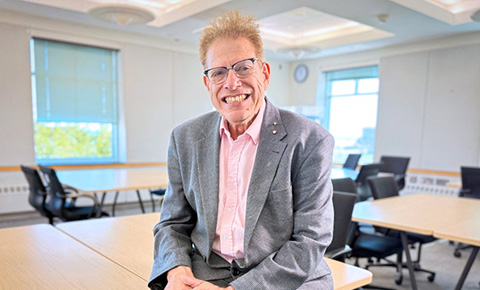Uri Wilensky Awarded 2025 Yidan Prize

Uri Wilensky, a preeminent scholar in computer modeling and simulations, has been awarded the 2025 Yidan Prize for Education Research, the world’s largest prize in education.
The honor comes with $3.8 million in support, half of which is a project fund to expand and scale the winner’s education initiatives. Announced by the Yidan Prize Foundation, Wilensky was recognized Wilensky for his groundbreaking work in agent-based modeling, which promotes complex systems literacy and bridges disciplinary knowledge.
An early pioneer of advocating for the power of computer modeling and simulations, Wilensky is the Lorraine H. Morton Professor of Learning Sciences and Computer Science at SESP and the McCormick School of Engineering and Applied Science.
- Read more in Northwestern Now.
- Read about Uri in SESP Magazine.
In 1999, he developed the free, open-source tool NetLogo to help users understand complex systems problems such as climate change, pandemics, and economic instability. The platform allows people to explore and build models that illustrate how individual agents can interact with each other to create large-scale patterns. Both children and researchers can use the same tool, creating a universal language to approach complex issues in different educational and academic settings.
Wilensky hopes the prize will help him get NetLogo more deeply embedded in institutions, including classrooms, newsrooms and government. "I want to see most individuals and organizations become literate in agent-based modeling," he said.
Wilensky is the founding director of the Northwestern Center for Connected Learning and Computer-Based Modeling, president of the Northwestern NetLogo center, co-founder of the Northwestern Institute on Complex Systems and founding co-director of the joint PhD program in Computer Science and Learning Sciences.
He was elected a fellow of the National Academy of Education and the American Academy of Arts and Sciences. He has received numerous awards for his work, including the National Science Foundation Early Career Award, the Spencer Foundation’s Post-Doctoral Award and the 2016 International Society for Design and Development in Education prize for excellence in design for his work on NetLogo.
“Uri's research lives at the intersection of learning, computation, complexity theory and computer science," said Bryan McKinley Jones Brayboy, dean of the School of Education and Social Policy. "His life’s work has been about making these ideas available to everyone. He’s a gift.”